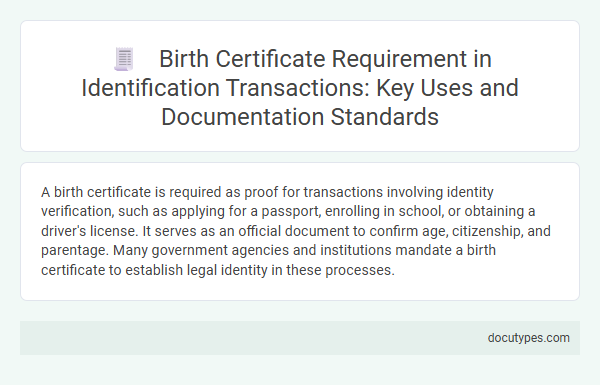A birth certificate is required as proof for transactions involving identity verification, such as applying for a passport, enrolling in school, or obtaining a driver's license. It serves as an official document to confirm age, citizenship, and parentage. Many government agencies and institutions mandate a birth certificate to establish legal identity in these processes.
Introduction to Birth Certificate Requirements in Identification
A birth certificate serves as a fundamental document in verifying identity for various transactions. It provides official proof of your birth details, including your full name, date of birth, and place of birth.
Transactions such as applying for a passport, enrolling in school, or obtaining a government-issued ID commonly require a birth certificate. Presenting this document ensures that your personal information is accurately confirmed during these processes.
Importance of Birth Certificates in Identity Verification
| Type of Transaction | Reason for Requiring Birth Certificate | Importance of Birth Certificate in Identity Verification |
|---|---|---|
| Applying for a Passport | Establishes legal identity and citizenship | Birth certificates provide verified proof of date and place of birth, essential for issuing a valid passport |
| Enrolling in School | Confirms age and legal guardianship | Birth certificates help verify a child's identity and ensure correct enrollment in the appropriate grade |
| Obtaining a Driver's License | Proof of age and identity | Used to confirm eligibility based on age requirements and establish an official identity record |
| Registering for Social Security or National Identification | Verifies birth details and citizenship status | Birth certificates act as foundational identity documents for issuing official government identification numbers |
| Getting Married | Confirms age and identity of individuals | Ensures legal compliance by verifying identities and ages before issuing a marriage license |
| Claiming Inheritance or Insurance Benefits | Establishes legal right as a beneficiary | Used to prove familial relationships and identity to process claims |
Common Transactions Requiring a Birth Certificate
Birth certificates serve as fundamental proof of identity in numerous official processes. You must present this document to verify your personal information accurately.
- Applying for a Passport - A birth certificate confirms your citizenship and date of birth when submitting passport applications.
- Enrolling in School - Schools require birth certificates to establish the student's age and identity during registration.
- Obtaining a Driver's License - Birth certificates verify your identity and age to meet legal driving requirements.
Ensuring you have an accessible and valid birth certificate can simplify many essential transactions related to your identity.
Legal Framework Governing Birth Certificate Usage
Birth certificates serve as primary identification documents in various legal and administrative transactions. Their use is regulated by national and state laws to ensure authenticity and prevent identity fraud.
You typically need a birth certificate when applying for a passport, enrolling in school, or obtaining government benefits. Legal frameworks specify when and how birth certificates must be presented to verify identity in these transactions.
Documentation Standards for Birth Certificates
What type of transaction requires a birth certificate as proof? A birth certificate is essential for transactions involving identity verification, such as applying for a passport or enrolling in school. It serves as an official document that confirms date of birth and parentage according to documentation standards.
Acceptable Formats and Issuing Authorities
A birth certificate is required as proof for transactions such as applying for a passport, enrolling in school, or obtaining a government-issued ID. Acceptable formats include original certified copies, electronic birth certificates issued by authorized government agencies, and notarized copies in some jurisdictions. Your birth certificate must be issued by recognized authorities like the vital records office, state health department, or local registrar to ensure validity.
Challenges in Birth Certificate Authentication
Transactions involving government-issued identification, passport applications, and enrollment in educational institutions often require a birth certificate as proof. These processes demand accurate verification to establish identity and citizenship.
Challenges in birth certificate authentication include the prevalence of counterfeit documents and variations in certificate formats across regions. Verifying the authenticity requires cross-referencing with official registries, which can be time-consuming and prone to errors. Digital solutions, such as blockchain-based verification systems, are emerging to enhance security and streamline the authentication process.
Alternatives to Birth Certificates in Identity Transactions
When establishing identity for transactions such as applying for a passport or enrolling in school, a birth certificate often serves as the primary proof. You may need alternative documents when your birth certificate is unavailable or insufficient.
- Government-Issued Photo ID - A driver's license or state ID can substitute as proof of identity in many cases.
- Social Security Card - This is commonly accepted to verify your identity alongside other documents.
- Hospital or Birth Records - Certified hospital records may be used when an official birth certificate cannot be provided.
Protecting Sensitive Information in Birth Certificates
Certain transactions require a birth certificate as proof to verify identity and protect sensitive personal information. Handling your birth certificate carefully helps prevent unauthorized access to private data and identity theft.
- Legal Identification - A birth certificate is essential for obtaining government-issued IDs such as passports or driver's licenses.
- Enrollment in School - Schools require a birth certificate to confirm age and identity before admission.
- Claiming Benefits - Birth certificates are used to prove eligibility for social security, health insurance, and other government benefits.
What Type of Transaction Requires a Birth Certificate as Proof? Infographic

